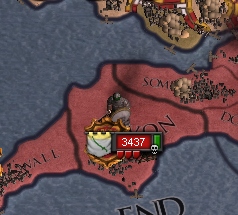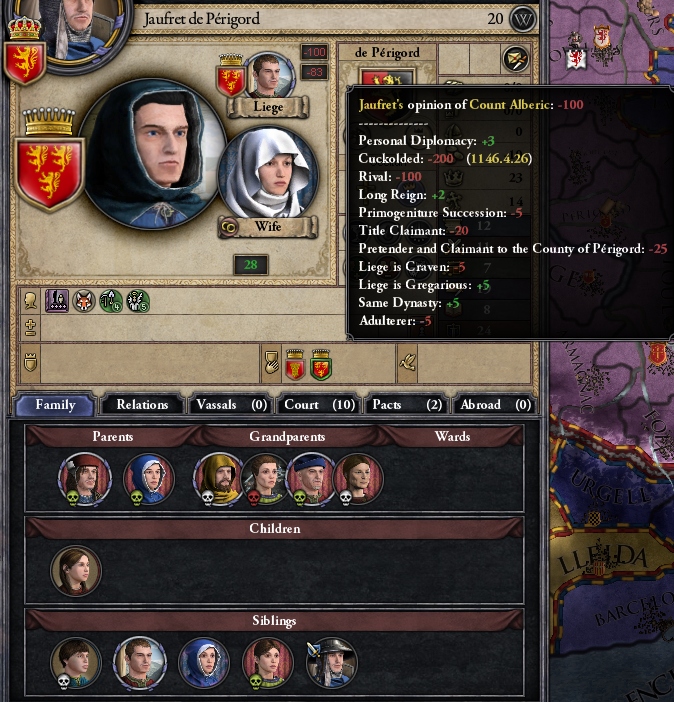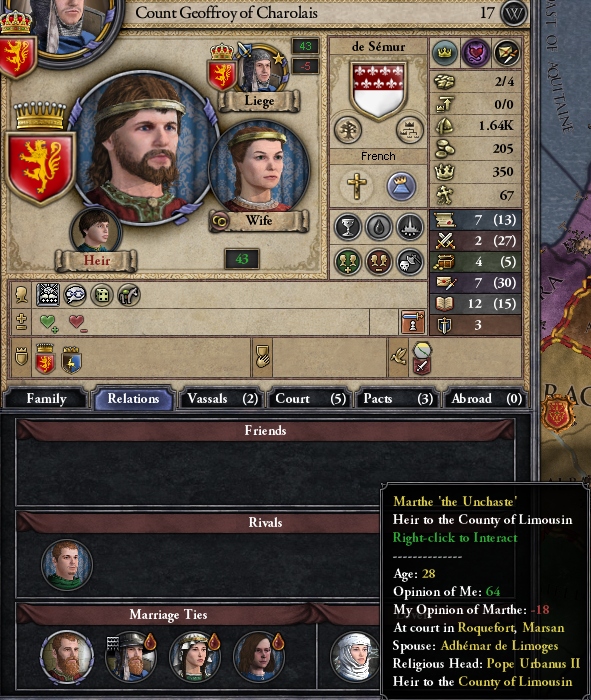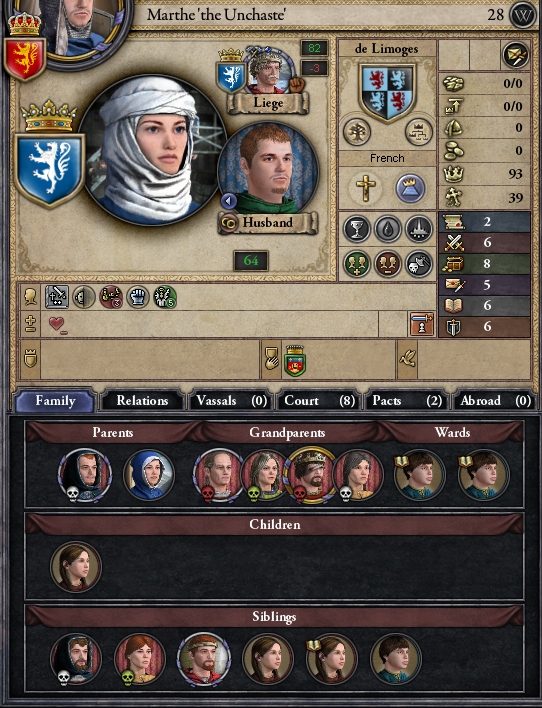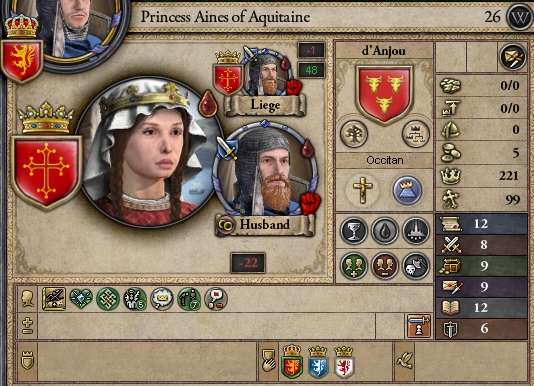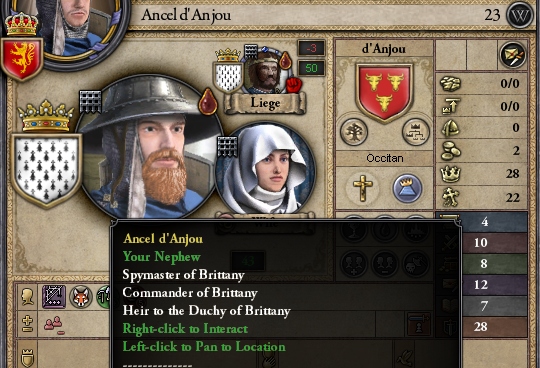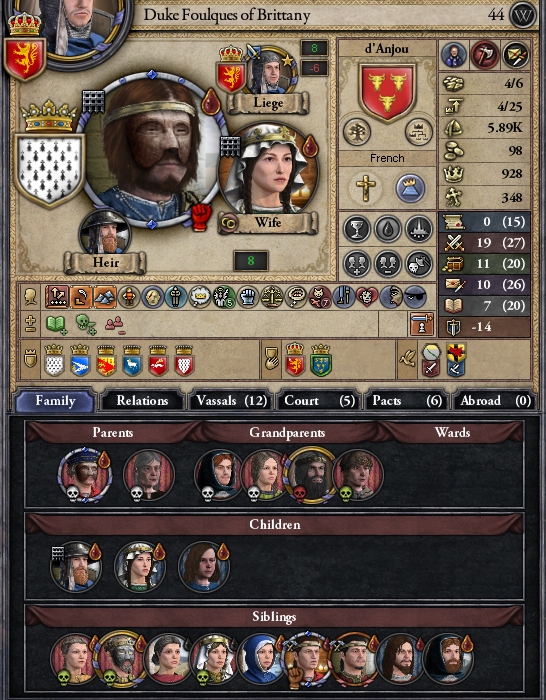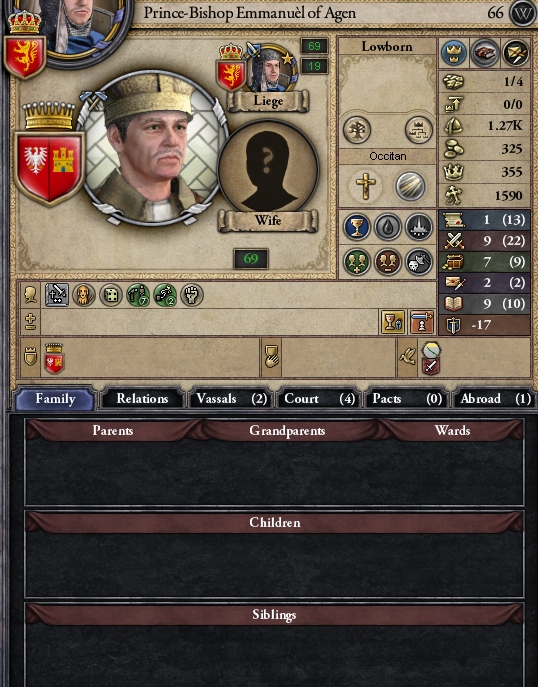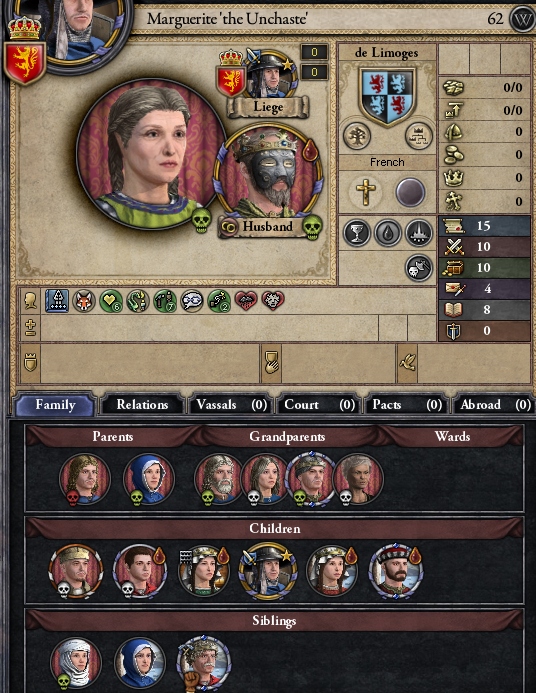Before Plantagenet - Chapter 268
December 1138 - Bordeaux, Kingdom of Aquitaine
Two lords. Two very different sets of circumstances.
A little over a month ago, Geoffrey stood in the hall of the castle of Pamplona, prideful and joyous over the occasion. He was officially raising his brother Alias as the Duke of Navarra and the lord of the counties within.
It felt a long time coming for Geoffrey, and he suspected Alias as well. After all, Alias had long pestered him to go to war to claim those titles. It had been a half-decade before when the idea had formed thanks to the late Cardinal Arrigo and had been a tease at time for the prince.
Envious and conspiring uncles, tumultuous affairs, the conquering of another kingdom, disobedient wives and vassals, tricks and other machinations had threatened to stop Geoffrey from fulfilling his promise. But he had overcome them, and in doing so fulfilled another promise - one over a decade old, made to his dying father to take care of his brother.
And with Alias receiving Navarra… he had.
He had made his brother a duke, married him to a foreign princess. He had made his youngest sister a duchess, overcoming his own reluctance to do so. And he had made himself king of two realms.
I don’t think you could have any complaints about how this has turned out, father, Geoffrey thought that day as he saw the filled hall, the banners hanging and his brother and sister-by-law approaching him to be officially named duke and duchess of Navarra.
Today, however, another set of oaths were to be arranged. And Geoffrey was not sure what to expect with this new lord.
Henri of Limousin stood before Geoffrey and Bishop Edouard, as the three met in the king’s strategy hall in the palace of Bordeaux. Geoffrey sat on his throne, eyeing the son of the late and troublesome Count Gui, wondering which way this meeting would go.
The red-haired young man was Geoffrey’s junior by a few years, but was now set to become one of his men, as Count Gui had passed a month before, around the same time of Alias’ raising.
Handsome, with an immaculately groomed mustache and goatee, he came dressed in a clean green tunic, with a red cloak draped over his shoulders. Such things were expected when meeting with a king, but after Duke Gunzelin a few months before, Geoffrey could not take it for granted.
And much like that meeting, and not like Alias’ raising, Geoffrey was uncertain of the intentions of the man before him.
Henri had reason to be prideful as an owner of illustrious blood in his veins - his mother, the former countess Catherine, was also a Princess of the Franks - the daughter of the late King Philippe I. It made Henri, like his cousin Knud, a grandson of a former king and nephew to a current one in the ailing Alphonse.
But despite that familial bond with the Dane, Geoffrey suspected there was no love lost between the two men. After all, Knud had murdered Henri’s other grandfather - Count Toumas of Limousin. Knud’s lack of punishment by Geoffrey’s father had been a primary source of discord between the late Count Gui and the Angevins.
Not to mention Gui repeatedly seduced Princess Aines, siring two children with her, and making an attempted pass at the queen, who had rejected him.
And yet Henri was a cousin of the king, as queen-mother Marguerite was a member of the de Limoges house. As non-Angevin lords went, only Adhemar, also of the de Limoges house, and Small Fry of Charolais of the de Semur line were of closer relation to Geoffrey than the count of Limousin.
So it was anyone’s guess how this meeting would play out, leaving Geoffrey to conduct it behind closed doors.
But despite his concerns, Henri had shown no anger on his face when he entered, and greeted Geoffrey with a bow.
“My king,” Henri said. “Thank you for receiving me. I know you have much to deal with these days.”
“This is one of those things,” Geoffrey replied. “My father never liked to depart on things of great import while having things to be done here. And the oaths of a new lord are one of those things.”
“I am happy to hear this has as much importance to you as it does me,” Henri said. “Though I understand why it may be required to keep this small.”
“Your compassion is a fine change from many I have dealt with in your position,” Geoffrey said.
“Given your mother is a cousin of mine,” Henri began, “and her friendship with my grandfather Toumas, it is the least of what I can do.”
“Have you had the chance to see her?” Geoffrey asked.
“I did,” Henri said. “I was happy to - my grandfather Toumas spoke so well of her. I remember him telling me as a boy to disregard the slander some talk of with her. He had seen the goodness in her heart back when they were young and even if the world had hardened her, underneath, she was a good woman.”
Geoffrey nodded, feeling a pang of sadness twist at his stomach.
“While we are on the subject of family, my king,” Henri continued, “I wish to offer my apologies.”
“Apologies?” Geoffrey asked. “For what?”
“My father,” Henri said. “He never did forget the death of his father at the Dane’s hands. But that does not excuse his actions. He was a scoundrel.”
“I’m surprised to hear you say such things,” Geoffrey admitted.
“It is the truth,” Henri said. “The man was terrible to my mother, and I never could trust what his plans were. I suspect they would have harmed my family in the future. And the affair with your sister… it was wrong. So very wrong. I can only hope to make amends to you and your family in time.”
Geoffrey was genuinely surprised to hear such talk. He thought very poorly of the late count, suspecting it was because of Knud’s murder of Count Toumas, but Geoffrey had an expectation that grudge might continue. That the new count was both willing to put it aside and apologize for it, boded well.
“Consider it a fresh start,” Geoffrey said. “Your grandfather Toumas performed many a great service for my family, and you appear to be cut from a similar cloth.”
“Thank you my king,” Henri said. “It warms my heart to hear such things.”
“Now then, to the business of your oaths,” Geoffrey said. “I cannot promise you a time yet for a more grand affair. However, I can offer you a brief ceremony with the members of my council and Prince-Bishop Emmanuel, if you so choose. That can take place tomorrow.”
“I think that suits me just fine,” Henri admitted. “I have never been fond of grandiose shows. There is too much which can go wrong.”
He paused and then grimaced. “No offense to your father of course. I have heard he was the master at such things. I would not dare to dream I could approach his skill in that regard, nor would I try.”
Geoffrey chuckled. “I don’t blame you, for I can tell you it is no easy task. But we shall do the small ceremony tomorrow and explore if a grander event is required."
“Thank you, my king,” Henri said as he bowed once more. “Again, you have my gratitude for your treatment of me, my apologies for my father’s treatment of you, and my prayers for your mother.”
Geoffrey nodded and watched the new count departed. Turning to Edouard he said; “That went better than I could have expected.”
“Agreed,” Edouard said. “Though I have heard Henri truly grew apart from his father in recent years. The old count Gui had suffered through increasing madness, and Henri feared his father might look to disinherit him in favor of his half-brother.”
“My bastard nephew?” Geoffrey asked.
Edouard nodded. “I learned of this from their priest. He did not know whether Henri had proof of such things, but he certainly believed it.”
“Then another reason to say ‘good riddance to Gui,’” Geoffrey said. He paused for a moment. “Forgive me, for speaking ill of the dead.”
Edouard made a quick cross in the air. “You are forgiven. Most kings would not have cared to even ask for such a thing.”
Geoffrey shrugged. “We survived Leyre due to God’s blessing. I do not wish to draw his ire, as I have come close to doing in the past.”
Edouard chuckled. “I won’t look to talk you out of reasons to be more pious and that one is certainly a good one. And if said piousness extends to England, I know Duke Osmund will be glad to hear it.”
The Duke of Kent had come to Pamplona a month before, acting as Queen Ælfflæd’s emissary, having been restored as her chancellor in place of Duke Sigeric of Essex. He was begging for aid then, as the heathens had landed on England’s shores.
But Geoffrey could not possibly move his army to England in an instant. It would take months for them to travel to Brittany and then cross the channel. And as it was, he intended to wait until the spring to make his move. They needed to recover after years of fighting and a difficult battle in Leyre.
“Of course,” Geoffrey grumbled. “Have I not told them I will bring my men as soon as it is feasible?”
“Well,” Edouard began. “Lydford is under siege.”
Geoffrey rolled his eyes. “Of course it is. This is what my wife has wrought.”
“Be that as it may…,” Edouard continued, “we did promise to defend them. And even if we had not, you are King of England after all.”
“And I will provide aid,” Geoffrey said. “When my army is good and ready. Leyre took much out of us. And it is winter. We will aim to arrive by the spring.”
“Osmund fears they cannot hold out that long,” Edouard said.
Geoffrey let loose an exasperated sigh. “He can look to his niece then and not to me. I didn’t attack the heathens. She did. England’s suffering is on her head, not mine.”
“Right as you are, should Lydford fall, and the queen with it, then all would be lost,” Edouard said.
“Tell her to quit Lydford and wait for me to arrive,” Geoffrey said. “Let her hide in Kent, or Mercia.”
“Osmund said she does not wish to flee her keep,” Edouard said. “Given what happened to her father.”
“Then she should know full well the consequences of staying too long,” Geoffrey said. “If she wishes to be obstinate, that is her problem, not mine.”
Geoffrey eyed his cousin, looking to see how far he’d continue this argument. The king was willing to fight as long as he needed to - he might have acquiesced to providing aid for England, but he was through letting his wife dictate how and when his men were deployed. If she wished to risk herself because she did not like his timeline, then he had no problems letting her pay the price.
Of course it was easier with Berard not in his ear. And his friend had not been for a few weeks now, having been forced to return to Perigord alongside his sister Ana to sort out a family matter.
“Have you heard word from Berard and Ana?” Geoffrey asked.
“Yes, a rider arrived earlier and said they are returning from Perigord,” Edouard explained. “Their brother Jaufret is with them.”
Geoffrey’s brow rose. “He is coming here?”
“I gave them leave, given the delicacy of the situation,” Edouard said. “If it displeases you, I can find something for him to do in Angouleme. Or Angers. Somewhere.”
That was met by a shake of the head from Geoffrey. “It’s fine. They prevented bloodshed, I suppose.”
“There is only so much that can be done,” Edouard said. “Jaufret is furious with Alberic. He feels betrayed. And he’s right to. He’s not certain his daughter is his own!”
Geoffrey could only nod. Alberic, Count of Perigord, had been caught in a scandal that rivaled the king’s worst. He had been found to be bedding the wife of his youngest brother, Jaufret, leaving the distraught young man furious and ready to challenge his elder brother to a duel.
Berard and Ana had both ridden to Perigord to stop that from happening, and it appeared they had been successful on that front. But any reconciliation between the oldest and youngest surviving Perigord boys was apparently some ways off.
“Miserable business,” Geoffrey said. “There are some lines which should not be crossed.”
Edouard’s gaze fell from the king, but he did nod.
“Please,” Geoffrey said. “I have done some… poor things. But I will not ever touch my brother’s wife. Even if she didn’t look like a camel.”
“I admit, this is a step beyond,” Edouard said. “But it is not the only point of discord between family that must be dealt with. Uncle Adhemar wishes for your intervention in regards to his son and Small Fry.”
That was the type of affair Geoffrey was more accustomed to dealing with. Marthe, the wife of his younger cousin Adhemar, had been caught with another of his cousins, Count Geoffrey of Charolais. It had left both Adhemars furious, but turning to violence over the matter was difficult due to the men being of close relation - Duke Adhemar was the brother to Mascarose, Small Fry’s mother, thus making him the count’s uncle.
And even Marthe herself was not a nobody. She was the sister of Count Henri, meaning she was a cousin of Geoffrey and granddaughter to a Frankish king. Any death or severe punishment would be a negative outcome for everyone.
“What is there to be done?” Geoffrey asked. “Small Fry was wrong. But my uncle should know better than anyone else - if I come down harshly upon him, I will look like a hypocrite. I have to let it go.”
“That’s why he hopes for a private mediation,” Edouard said. “That something can be done to make amends privately.”
“Unlikely,” Geoffrey said. “What does Small Fry say? Have you heard from him?”
Edouard nodded. “He claims the lady was in need and that the younger Adhemar has not fulfilled his husbandly duties.”
“Something Alias told me before makes me think that is true,” Geoffrey said. “And she seems to have inherited her father’s appetites. I do have much sympathy for the lady. But it does not make it right.”
Edouard smirked. “True enough. Shall I arrange the meeting then?”
“Yes,” Geoffrey said. “But I cannot deal with such things. You can handle it.”
“Me?” Edouard asked, pointing to himself. “I am not you.”
“Exactly,” Geoffrey said. “You are their first cousin, as I am. But you are a man of the cloth - a perfect judge of such matters.”
“And how am I to judge?” Edouard asked.
“You doubt your capabilities?” Geoffrey asked.
“Forgive me, I did not speak clearly enough,” Edouard said. “How do you want me to rule? Our cousin Adhemar is the heir to one of the realm’s most powerful lords, but Small Fry is one of your lords already. They are both family, but Small Fry has the added advantage of being related to you on your father’s side as well, so he may expect further leniency, especially since the nature of the crime is rather… Angevin in nature.”
“Reprimand Small Fry,” Geoffrey said. “Demand repentance of some sort. The same with Lady Marthe. Offer some consolation to Adhemar, both of them. Praise his compassion and patience. And whatever else you feel you can give without running afoul of Small Fry or the church.”
Geoffrey’s experience had some bearing on his advice - he’d heard how his uncle Philippe had been handled after the affair with Sarrazine had been exposed.
“It will be done,” Edouard said.
“Good,” Geoffrey said.
There was a heavy knock and after a few moments, Geoffrey’s physician, the Hungarian Odin made a heavy walk across the hall to the king.
Geoffrey swallowed hard, fearing what was to come. He had dispatched his physician to treat his mother in hopes he could have the same success in alleviating her many recent issues.
But the sullen face worn by the physician did not bode well.
“Your mother’s fever is very high and she is delirious much of the time,” Odin explained. “I have done what I can, but she grows weak.”
Geoffrey’s stomach twisted in knots at just the thought of what was to come. He even struggled to get out the words to ask his question. However, Edouard was of a similar mind.
“Is all hope lost?” Edouard asked. “Can she pull through?”
Odin shook his head. “I summoned the prince-bishop for her. I would go to her now, my king.”
And there it was. The news that Geoffrey dreaded. But it was inevitable.
He had heard his mother Marguerite’s health had begun to decline steadily not long after the battle at Leyre. At first, he didn’t think much of it - after all, his mother had been near death before and survived. Marguerite may have hated life, but she refused to leave it - fighting through a great deal in the past to persist past so many of her peers.
But his older sister Beatritz, who had come south to care for their mother, had implored him and their siblings to come to Bordeaux right around when Alias was raised, for she believed Marguerite’s time was growing short.
On that, Geoffrey had come, and was coming back anyway, since Alias had been seated in Navarra. With the prince establishing himself in his new duchy, he had remained back initially. Aines, meanwhile, claimed she had too much to do in Toulouse with her husband in the field fighting the rebellion against him to depart the duchy at that moment.
But Marguerite’s condition had steadily deteriorated over the past few weeks and Geoffrey had been forced to send urgent messages to Alias and Aines, telling them to come. However, they had yet to arrive.
“How far away are my siblings?” Geoffrey asked Edouard after Odin had left.
“Prince Alias is about two days away,” Edouard told him. “He would have been here already, but was delayed by a storm, which made the roads too muddy to travel. Your aunt, Lady Mascarose, should be here by this evening.”
Geoffrey frowned. “And Aines?”
“Even further,” Edouard said. “The same storm which halted Alias likely affects her travel as well.”
Geoffrey cared less about that. Asking about her was more a courtesy - it seemed the proper Christian thing to do. And he was a proper Christian, after all.
But had he been proper in the past? The king’s eyes fell to the floor as he remembered his last serious conversation with his mother… back in Iberia. The one where he had refused her request to become his chancellor and done so in a manner so cold that she had compared him to his father.
He didn’t even need to ask what she had meant by saying he had “his father’s eyes.” It was clear from her expression. From her tone. And her face had haunted him in recent days as her condition worsened.
“Did I break her?” Geoffrey asked his cousin, unable to raise his gaze to the bishop’s. “Did I destroy the will she had left by refusing her request? I could see how much I… how much turning her down hurt.”
“You had no choice,” Edouard replied. “It would have been another problem for your reputation. For a woman of her age and experience, she should have known that.”
“I know,” Geoffrey replied. “But she wanted to help me. For all I can fault my mother for… I cannot deny she wishes the best for me.”
“Then she had to know why you turned her aside,” Edouard said. “For it would have brought more harm than good.”
Geoffrey sighed, knowing his cousin was right. But he also understood that his mother wasn’t always the most rational of persons. He guessed she did want to help, and the fact she brought up his aunt to him, her old rival, made it clear she thought she deserved it based on that. To have given prestige to Aunt Agnes but not her…
His reasons, good as they might have been, no doubt stung. And Marguerite’s health turning for the worst in recent months may well have had something to do with it.
“I should not wait any longer,” Geoffrey said. “If I am not with her at the end… after I was with Aunt Agnes… she would probably badmouth me to the Lord for eternity.”
Edouard grinned. “I do not think her capable of truly badmouthing her sons.”
Geoffrey wanted to smile at that. But he just felt guilty at even suggesting such a thing of his mother.
The king then made the walk to his mother’s chambers, trying to prepare himself for what was to follow. He didn’t know how much time she had left, or even if she would be alive when he arrived. If Odin had summoned for the priest…
He feared not making it for Agnes. And he did for his mother as well, though he did not know what he would say. Nor did he know what he would feel. One part of him wanted to slow down, and the other wished to quicken his pace to make sure he got there. His heart raced regardless.
When he did arrive, his racing heart skipped a beat as he saw Prince-Bishop Emmanuel leaving the chamber.
Am I too late?
“King Geoffrey,” Emmanuel said.
“Is she still with us?” Geoffrey asked.
“Yes,” Emmanuel said. “She is weak however. I would not think she will make it to the morning… but your mother overcame severe illness before.”
“But you gave her… last rites?” Geoffrey asked.
“I must do it before,” Emmanuel explained. “So I can take no chances.”
“Of course,” Geoffrey said. “Thank you.”
“If you have any further need of me, I will not be far,” Emmanuel explained.
Geoffrey nodded and then entered his mother’s chambers. There, he found Beatritz seated at Marguerite’s bedside. Once the duchess caught sight of him, she made her way over.
“I have heard nothing good,” Geoffrey whispered, not wishing to bother his mother.
“Because there is nothing good to say,” Beatritz told him. “No matter how much we wish it.”
Perhaps it was her age - Beatritz was a decade and half older than him - but the whole ordeal just seemed to weigh on the duchess more than most. She had lost weight since she’d come to defend the marriage of her daughter to Duke Guilhem a few years back. The lines in her face had increased as had the amount of gray in her hair.
But despite their previous disagreements and cold relationship, Geoffrey was grateful she was here. He could not attend to his mother now - the realm needed him for one and he doubted he could handle the emotional weight anyway. There was no one better for Marguerite than Beatritz, save possibly Mascarose, and his aunt had likely been busy trying to help put out the fire her son had started with his affair.
“Is Ancel en route?” Geoffrey asked.
“I hope so,” Beatritz said. “I implored him for weeks to come. But he insists he is busy with keeping Brittany going, as his father struggles to do anything but yell at anyone who comes close.”
“Uncle Foulquesson has deteriorated further?” Geoffrey asked.
Beatritz shrugged. “Mentally if not physically. After his mother’s death a few months ago, he became even more short-tempered with everyone. I think it reminded him of what awaits… and his frustration he has not been able to find a good death in battle. Which, I imagine he will seek with your men when you travel to England.”
“If he is up to joining us, I will not turn him away,” Geoffrey said, as his Leyre near-disaster made him more receptive for his prickly but still talented uncle’s help.
There was a groan and Geoffrey looked over to his mother, who was stirring slightly. A cloth was on her forehead, as she lay under blankets, her complexion pale and sickly. The king moved by her side and took her hand, which had become almost skeletal.
“Mother,” Geoffrey said. “Are you all…”
He paused, realizing she was most certainly not alright. All he could manage was a shake of the head at his mistake.
“Is that my sweet boy?” Marguerite asked. Her eyes opened and a small smile came to her face as her gaze met Geoffrey’s. “My boy. My conquering hero.”
Geoffrey smiled broadly at the compliment and glanced back at Beatritz, who came up beside him.
“Leave us,” Marguerite instructed her daughter. “I wish to be alone with him.”
To that, Beatritz frowned but said nothing. She simply bowed and then made her way from the chamber, closing the door behind.
“You came,” Marguerite said. “I was worried you would not come. That you might abandon me, after all the pain I have caused.”
“Of course I came,” Geoffrey said. “I… I was delayed. It was hard to see this. But I had Edouard and Odin keeping me updated. I would not abandon you, mother.”
“Edouard?” Marguerite asked.
Geoffrey did not say anything to that. He knew his mother’s mind was failing. And he did not want to push her on it.
Still, there were tears in her eyes, running down her face. “It has been so long since I have seen you. I have missed you so.”
Geoffrey was taken aback. He knew his mother cared about him, but she made it seem so… extreme. He had not seen her much since his return, but it had not been that long since Iberia.
“It has only been a few months,” Geoffrey said.
“Perhaps time moves… differently for you,” Marguerite said. “But it has been an agonizing wait for me. How I prayed I would see you again. Before it was too late. You and your brother. To guide me to the hereafter, even if you must leave me again after.”
“Alias will be here soon,” Geoffrey said. “He has been delayed by storms.”
“Alias…” Marguerite whispered. “Such a horrid count. Loyal to your father. But I shall not enjoy seeing him again. Neither of them. Nor your aunt.”
Geoffrey smirked. That wasn’t a surprise.
“Not Count Alias,” Geoffrey told her. “I meant your youngest, Alias. Prince of Aquitaine and now Duke of Navarra.”
Marguerite’s eyes widened. “He must not go! There is nothing but danger there. It is cursed! I cannot lose him like I lost y--”
“It is fine,” Geoffrey said, not wanting his mother to grow agitated over nothing. “The war is over. He is duke. He is in no danger,”
“You cannot know that,” Marguerite insisted. “The curse could strike outside of battle. It is a sinister force… it… it…”
Her voice trailed off as she fell almost limp in her bed. Geoffrey’s heart skipped a beat, as he feared she was about to leave him.
But her breathing remained, even it was shallow. Gently, he tried to soothe her by rubbing the cloth on her forehead. She was burning up and yet in blankets - Odin had mentioned to him she had been chilled.
“When will it be time?” she moaned. “When will we go?”
The question unnerving, Geoffrey simply answered: “Hopefully not for a while yet.”
When Marguerite simply moaned in response, Geoffrey frowned.
“Is there anything you need of me?” he asked her. “I assume Beatritz has done a good job caring for you.”
“The poor girl,” Marguerite said. “She does what she can. But I can see the anger in her eyes. The betrayal… knowing I made life so hard on her with my sin.”
Geoffrey guessed his mother referred to the affair she carried on with Aubry Karling, who was likely Beatritz’s actual father. It was a rumor that had mostly drifted from the court as the years passed following Beatritz becoming Duchess of Brittany, but those close to them had not forgotten.
“She is a dutiful daughter,” Geoffrey said. “And you provided well for her. She is a duchess, after all.”
Marguerite mustered a small smile and reached up, with trembling hand, toward him. A chill ran down Geoffrey’s spine, but he resisted his revulsion and leaned forward, allowing her cold fingers to run against his cheeks.
“You have always been so kind to me,” she said. “My little protector. But I failed to protect you. I am sorry. I am so sorry.”
Geoffrey’s brow rose, for he felt she had it quite wrong. He had not truly protected her at all. But she had protected him, the best she could, even empowering her rival Agnes to do it.
Perhaps she meant her desire to be chancellor? But even that, Geoffrey had come to an understanding over.
“You have done well for us,” Geoffrey told her. “Let us forget Iberia. It is in the past.”
“How can I forget Iberia?” Marguerite demanded. “It is where you fell! Had I done more, you would be still with us!”
“I did not fall in Iberia, mother!” Geoffrey assured her. “Leyre was difficult, but we won.”
“Leyre?” Marguerite asked. “Was it not Valencia?”
“No,” Geoffrey assured her. “Valencia was where…”
And suddenly Geoffrey’s eyes grew wide. He realized that his mother was not speaking of him. She was not, in her mind, even speaking to him.
“Foulques,” Geoffrey said. “You think I’m Foulques!”
“Are you not here for me?” Marguerite asked. “My sweet boy, giving me an escort I do not deserve to the hereafter?I prayed it would be you. It has to be you. Please let it be you.”
“I am Geoffrey!” he shouted. “The son who became king, not only of Aquitaine, but England! The man who bested and claimed Navarra for your youngest son, Alias! I have never been defeated, nor even wounded! I am not just some dead count of Poitiers and Saintonge!”
Marguerite just looked at him with wide eyes, and he hoped she would finally snap out of this daze. But she said nothing and in frustration, Geoffrey stormed from the room in a huff.
“Where are you going?” Marguerite called out. “Take me with you! Don’t leave me here! Don’t let them send that hag Agnes for me. Please!!”
Geoffrey turned back for a moment and saw the fear on his mother’s face - she could not bear him leaving. But the king shook his head.
No, she cannot stand my blessed brother leaving, Geoffrey thought.
And he is already long gone.
So Geoffrey exited the chamber and slammed the door behind. His stomach felt so twisted it hurt as he leaned up against the wood, while his breathing was rushed. Anger. Sadness. Frustration. Helplessness. They all tugged at him, fighting each other… so much so he dry heaved.
“Brother,” Beatritz began. “What happened in there? Does mother need help? I heard her screaming.”
Geoffrey, still leaning against the door, shook his head as he gripped the bridge of his nose. His eyes remained shut as he motioned back to the chamber.
“She… she cannot be helped,” Geoffrey said. “She thought I was our dead brother Foulques.”
“Oh… my,” Beatritz said. “She has… suffered through her delusions. When Lord Henri visited, she asked him why he had grown his facial hair out after all these years. She thought him his grandfather.”
“He was offended, I take it,” Geoffrey said.
“He did not show it,” Beatritz said. “Instead, he played along.”
Geoffrey grunted. “He has the patience of a saint. I will need to commend him prior to the ceremony.”
“What of mother,” Beatritz asked. “What did you tell her of our brother?”
“I…” Geoffery began. “I… left. I am not him. I am me. Her son who is a king. But she sees right past me, to some ghost of her past.”
“Not
some ghost,” Beatritz insisted. “Our
brother! Her dead son! It is not like there is no reason.”
“It’s not good enough,” Geoffrey insisted. “I am not about to sit there and have to… listen to
that.”
“How can you be so callous?!” Beatritz snapped. “Our mother is dying and all you can think of is yourself?! That in her poor state she wishes to see our lost brother?”
“He is not there for her!” Geoffrey retorted. “I am! I am the one who has always had to carry that burden of our parents’ miserable marriage. Making our bastard brother a bishop! Having to hear her complain about Aunt Agnes. To endure her perceived slights…”
“You know nothing,” Beatritz said. “Foulques had to comfort her when she was a pariah, when Duke Foulques had basically locked her away. But that is besides the point. You make it about you. It is always about you. Our mother lays dying… about to leave us forever, and it still must be how you feel!”
Geoffrey lowered his head. Even in his frustration, he knew his sister had a point. However, he didn’t think she fully understood why he was angry.
“Do you… do you know how insulting it is to offer yourself to someone, only to be told you’re not good enough? That she wishes someone else?!” Geoffrey demanded.
“No,” Beatritz said. “I would not know what it is like to take care for mother for the last few weeks, to have to beg for my siblings to come here to see her, and then, in perhaps her final moments with us, have her tell me to leave.”
What could Geoffrey say to that? He rarely felt anything toward his eldest sister, given she was a woman grown by the time he was born. They had spent most of their lives apart, both in a physical and mental sense - not to mention the added barrier of her suspected parentage.
But at the moment, Geoffrey could not ignore the sadness and pity he felt for Beatritz, as well as his shame at acting this way in front of her.
“I’m sorry,” Geoffrey said.
“I don’t want your pity,” Beatritz told him. Then she turned back to the chamber. “I’m going back to her. Even if she does not think of me as she does her boys, she remains my mother. And she gave me life. It is the least I could do.”
Geoffrey said nothing for that as Beatritz re-entered the chamber. He, however, stood motionless.
Did he wish to follow her? She had made a fine argument. And yet… what was the point? So his mother could continue to imagine him as his dead brother?
He had not said it to Beatritz, but there was more than just the mistaken identity. It was also how his mother viewed him and Foulques - his later elder brother was too good for this world, she believed. That he had been called to God because he was better than the sinful world he was a part of.
Unstated in that was everyone else was perfectly at home in such a place. And Geoffrey, king of that world, therefore was unworthy of a trip to heaven.
Given he loved living, Geoffrey didn’t exactly want to die and he believed he could earn his place by God’s side in time. But it was the principle - regardless of if his mother was right, that she believed Foulques was practically an angel, and himself a sinner… or worse, stung.
She did not have to think that, Geoffrey thought.
She did not have to voice that. This is her doing.
So he turned to leave. Let Beatritz deal with her. At least she’ll get her moment and perhaps the approval she so desires.
But Geoffrey stopped. He remembered his own illness, and how he thought he might not survive. How scared he was. How isolated he felt much of the time.
He remembered how word was passed to him that his mother wished to see him. She had even tried, but was too weak from her own illness to make it to his chamber. And Geoffrey cried that night because he did not think he would see his mother ever again.
His eyes fell to the ground. It was well over ten years now… and much had changed. But was he so far gone from that boy… that he could turn his back on his mother? Someone who, despite her thoughts on her sons, did all she could to protect her children, even at the sacrifice of her pride?
Perhaps the only time she set aside her pride, he realized.
Taking another deep breath, Geoffrey turned back to the chamber and at a brisk pace, entered. He hoped that perhaps his dramatic entrance might have shocked Marguerite to her senses, or perhaps Beatritz talked sense to her.
But the first words from her mouth upon seeing him were: “Foulques, I thought you had abandoned me.”
Again the words stung and he was tempted to leave again.
However, Beatritz’s glare pinned him. She knew what he was thinking. And he could not bear the shame of abandoning their mother again under her watchful eyes.
He said nothing though, as he sat down next to his mother once more, with Beatritz on the opposite side. Enduring his mother’s mistaken belief was one thing. Humoring it was another.
But his patience would be tested.
“Why are you silent?” Marguerite demanded. “Can you not hear me?”
Geoffrey just dropped his gaze from her. He wanted to flee the chamber once more. To be compared to a dead brother… to be forgotten for said brother…
“Are you angry with me?” Marguerite asked. “Do you hate me for betraying your father? I’m sorry. I’m sorry. I… I…”
Geoffrey stood so abruptly it caused Beatritz to flinch. He couldn’t help it - it was impossible to take any longer. He gave a look to the door and his eyes lingering on it for a moment.
Then he gaze shifted back to his mother, who looked on the verge of tears. Closing his eyes and gripping her hand he said: “I am not angry with you mother. Your mistake… your action… it was between you and he. Do not worry yourself about us. You did what you could. We could ask for little more.”
And though he spoke those words because they sounded nice, he realized quickly they weren’t untrue. Marguerite had done what she could do for him, and then when she couldn’t, she handed him off to Agnes. To Adhemar. To Knud. To Count Alias while he lived, and the old king as well. And when she saw they were gone, she tried to do one more thing - even if he rejected her.
“But if I had said more,” Marguerite said. “Had I fought your father… perhaps you would still be here.”
Geoffrey winced, tears squeezed from his eyes. “You cannot blame yourself. We make our own choices. I am a man grown. You did your part. Now we must do our own.”
Marguerite fell silent. Then her eyes grew wide.
“Geoffrey,” she said. “Geoffrey… I am so sorry.”
“I’m certain he understands,” Geoffrey said. “He can be… stubborn. But in time, with some help, he can understand.”
He glanced over to his sister, who smiled slightly at him, despite the tears in her eyes.
“No,” Marguerite said forcefully. “
You. Geoffrey.”
Now it was Geoffrey’s turn to look surprised as his gaze quickly returned to Marguerite. “Mother! You recognize me!”
Her face grew red. “I’m sorry. My mind is playing tricks on me. I see all manner of things. I thought it was your brother… here to take me.”
Between the redness of her embarrassment, and her sullen eyes, Geoffrey couldn’t help but feel pangs of guilt. Had he really grown that angry with a dying woman?
“It is fine mother,” Geoffrey said. “I am here. As is Beatritz. Alias and Aines are on their way.”
“I knew
you would be quick enough,” Marguerite said. “You always came quickly. A funny story that… perhaps when I knew you would never be second to anyone.”
Geoffrey scratched his head. “What do you mean? What story?”
“A pity there may not be anyone left to tell it,” Marguerite said.
“You can tell it,” Geoffrey told her.
But Marguerite did not answer, the small grin remaining on her lips. Geoffrey gently shook her hand.
“What is the story mother?” Geoffrey asked again.
When there was again no answer, he looked her over, and found her perfectly still. He did not even see her chest rise any longer.
“Mother?!” Beatritz asked. “Mother?”
A chill ran down Geoffrey’s spine. He stood up and moved to call for his physician. But the words did not come out. He knew it was pointless. He knew she was gone.
….
Geoffrey was not sure what he expected to feel when his mother passed.
His father’s death had left him with some sadness, but also a great deal of fear and anxiety as he was now king on his own. Agnes’ death left him heartbroken and somewhat lonely, as he lost perhaps the person who’s opinion on life he trusted the most.
He certainly felt some sadness now that Marguerite had left him. But mostly he just felt empty, as if a massive hole had formed in his chest that was too vast to be filled.
It was strange because he would never have counted himself close with his mother. He honored her as he felt a son should, but she was often an annoyance more than anything else. Her insistence his bastard brother be elevated to bishop, her actions that saw him put into conflict with Pope Martinus in Rome, and just a half year before, her demand to be installed as his chancellor.
But he also knew she loved him and always fought for his protection. If she wished to meddle in everything, she could have. Instead, she mostly stepped back, only interfering when her emotions got the better of her. Which was too frequent for his liking, but perhaps it was what should have been expected given he believed women tended to be more emotional.
So a day later he found himself no closer to his answer as he sat alone in his chambers, sipping on wine. His mind did frequently return to her story though - the tease she had offered him with her last words. How did she know he would be destined for such things, to never be second to anyone?
It was foolish to dwell on such things, he realized. He had to prepare himself for his brother’s arrival, which would likely happen later that evening. A rider had been sent out to inform him, but it would still not be easy when he arrived. Alias was closer to their mother than he was - it would likely hit him harder.
His Aunt Mascarose had been distraught when she had reached Bordeaux the night before. But Geoffrey had not told her - Edouard had been the one who had delivered the news, saying the king and his sister were both unable to speak to her at that moment. No such luxuries could be afforded with Alias.
Meanwhile, Geoffrey wasn’t exactly sure how his sister Aines would react, though he imagined she might celebrate in private.
It would prove her every bit mother’s daughter if she does that, he thought.
His thoughts were interrupted, however, by Prince Bishop Emmanuel, who had come to discuss the arrangements for Marguerite’s funeral.
“King Geoffrey, how do you fare?” Emmanuel asked. “It is never easy to say goodbye to a parent.”
Geoffrey nodded. “It is difficult to put into words how I feel. My mother… my mother was complicated.”
“That she was,” Emmanuel said. “A woman who… almost lived two lives. When I met her upon my elevation to my role in Agen, she looked as though she had been through a lifetime already. And yet, she had so much more to experience… and endure. To become a queen, to lose two sons, have a daughter betray family… but also a son become a king to two realms, have multiple grandchildren, two daughters as duchesses, and of course, her youngest now a duke. So much to one person…”
Geoffrey sighed. Emmanuel recounted what had happened during his tenure at Agen, which conveniently left out the touchier subject of her affair with Aubry Karling, and the bastard it produced. And of course, the hatchet it had taken to her marriage.
Or, if Geoffrey was being kind, how it must have felt to know that her father had been murdered by her future father-by-law, who ruled where she lived. To have no escape, no hope… it was a powerlessness that was so uncomfortable to Geoffrey he tried his best not to think about it.
“I do know she was immensely proud of you, your highness,” Emmanuel said. “She had much fear when your father died… but you put her mind at ease with your efforts and success.”
As much as Geoffrey wished to smile at that, her insistence on becoming his chancellor suggested she didn’t quite trust him as much as Emmanuel believed.
“So she said,” Geoffrey said. “I mean, she even claimed she had a story about how she knew I would be second to no one. But… that she had the story was the last thing she said to me. She never told me of it.”
Emmanuel nodded. “I am sorry to hear that. It is a tragedy when things are left unsaid. But know that even if the story was not told… she did believe in you and was proud of what you have done.”
The words sounded nice but seemed empty. So a meek nod was Geoffrey’s only response. He wondered if Emmanuel might notice, but the prince-bishop seemed deep in his own thoughts.
“I wonder…” Emmanuel said.
“What do you wonder?” Geoffrey asked.
Emmanuel lowered his head. “Forgive me God. I think it necessary to speak on this.”
After crossing himself, the prince-bishop looked at Geoffrey. “Your mother confessed something to me during her churching after she birthed you. I believe it relates to what she told you before her death.”
“What do you mean?” Geoffrey asked, nervous over anything that might come out of a confessional.
“After your birth, your mother confessed she had terrible thoughts toward you,” Emmanuel admitted. “I’m sure you’ve heard her labors with you came so quickly she could not make it to her birthing chambers, and you were born in the strategy hall.”
“I am aware, yes,” Geoffrey said.
“Well, she believed it was a sign that you would not be content at being second to your brother, Foulques,” Emmanuel explained. “That in time you would desire more… his lands. His title. Perhaps his wife, his power… everything. That you would take his birthright - and kill him in the process.”
“Why… why would I do that?” Geoffrey asked. “And she thought that of a babe?!”
“I have heard worse thoughts of women,” Emmanuel said. “Especially during churchings. I find many struggle with their recovery from pregnancy. I advise prayer, for trust in God soothes most ills.”
Geoffrey was hardly comforted by such thoughts.
“She thought I would murder my brother?” Geoffrey asked. “Like a latter day Cain?”
“She struggled to make sense of it,” Emmanuel said. “But I bring this up because that is not what happened. When people see signs, they can be misinterpreted.”
“Clearly,” Geoffrey said.
“But she wasn’t wholly wrong,” Emmanuel said. “In fact, in the end she was quite right. You do have your brother’s birthright. It was not because of what you did, but it is what has happened. God did have a different role in mind for the younger Foulques… and one for you as well.”
Geoffrey eased back in his chair. He had not thought of it that way.
“So I was to lead Aquitaine?” Geoffrey asked.
“Yes,” Emmanuel said. “And England. Perhaps even all of Christendom in time. I know not if your brother had the qualities you do. The strength to handle the burdens… of two kingdoms and so much more.”
“Burdens,” Geoffrey said. “Like defending England against Fatimid invaders?”
Emmanuel nodded. “It is nothing to rise to a call you have sent out. But to defend others… perhaps even in circumstances less than favorable… your father could never muster such things. Your brother… he wished to, I think. But it was not his fate. You… that this story comes to you now? I think it is once again God at work.”
Geoffrey stroked his chin and slowly nodded. Emmanuel’s words made sense. Perhaps it was all a sign.
“Thank you,” Geoffrey said. “I will need your assistance however. I wish my mother prepared for burial. We will bury her as soon as my siblings have arrived. Then I will take my men north to fight the heathens that have landed on England’s shores. I will do what Thoraed could not - and show them how a true Christian king defends his subjects against heathens.”
Emmanuel smiled. “That is fine news, my king.”
“Thank you Emmanuel,” Geoffrey said. “Once more your counsel has proven invaluable.”
“It is my honor, King Geoffrey,” Emmanuel said. “And once more, may I offer my condolences for your loss. Your mother… she did not always lead the most Godly of lives. But she loved you dearly.”
“I know,” Geoffrey said. “Her devotion to her children was her most redeeming quality.”
That drew a nod from the prince-bishop before he departed from the chamber. Geoffrey then leaned back and sipped his wine, letting loose another sigh.
Her most redeeming quality, Geoffrey thought.
Does her devotion to her children make up for her affair? For her bitterness and short-sighted foolishness?
He swirled the cup, the liquid providing no insight. His eyes drifted upward.
Does it even matter, Geoffrey wondered.
Her worst offense took place before I was born. Decades before I was born. I never felt my father’s anger over it directly… it was a story, like my one grandfather murdering the other. All I knew was a mother who always wished the best for me, even if it made her miserable.
His eyes dropped before him, toward the door to the chamber. No one was left to answer his question. And in the end, he realized, it was out of his control now. His mother was with God now.
So Geoffrey dropped his knees. “Please, my mother is with You now. I know she was not the most pious of women, nor the greatest of Christians. She made many mistakes... but please forgive her. She has suffered enough in life. Let her have a place by Your side. She did not think herself deserving of one… but I pray you think otherwise.”
The king crossed himself in silence, before it was broken by a sob, muffled by his own hand over his mouth.







